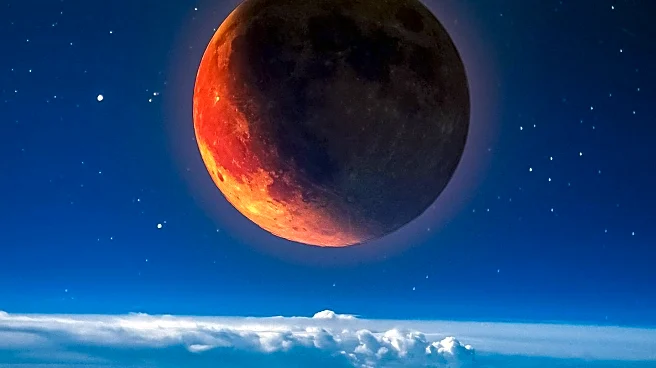What's Happening?
A blood moon, known scientifically as a total lunar eclipse, occurs when Earth's shadow completely covers the Moon, giving it a coppery red hue. This phenomenon happens only during a full moon when the Sun, Earth, and Moon align perfectly. The next total lunar eclipse is scheduled for September 7, 2025. According to NASA, this celestial event will be best viewed in Asia and Western Australia, where the eclipse will be visible in its entirety. Parts of Europe, Africa, eastern Australia, and New Zealand will also witness some phases of the eclipse. However, the Americas will not have visibility of this event. Blood moons are relatively rare, with Earth experiencing two to four lunar eclipses annually, though not all are total eclipses.
Why It's Important?
The occurrence of a blood moon is significant for astronomers and skywatchers, offering a unique opportunity to observe the alignment of celestial bodies. This event highlights the intricate dynamics of Earth's orbit and its atmospheric effects on light. For regions where the eclipse is visible, it provides educational and observational opportunities, potentially boosting interest in astronomy and science. The rarity of blood moons adds to their allure, making them a sought-after event for enthusiasts and professionals alike. The visibility in Asia and Australia may also influence tourism and local events centered around the eclipse.
What's Next?
As the date of the blood moon approaches, preparations for viewing events and educational programs are likely to increase in regions where the eclipse will be visible. Astronomers and educators may organize public gatherings and workshops to maximize the educational impact of the event. Additionally, media coverage and social media discussions are expected to rise, focusing on the scientific and cultural significance of the blood moon. Observatories and space agencies may also release detailed guides and resources to help the public understand and appreciate the phenomenon.
Beyond the Headlines
The blood moon's occurrence can spark discussions on the cultural and historical significance of lunar eclipses across different societies. Many cultures have myths and legends associated with blood moons, which can be explored in educational contexts. Furthermore, the event underscores the importance of scientific literacy and public engagement with astronomy, potentially inspiring future generations to pursue careers in science and technology.








